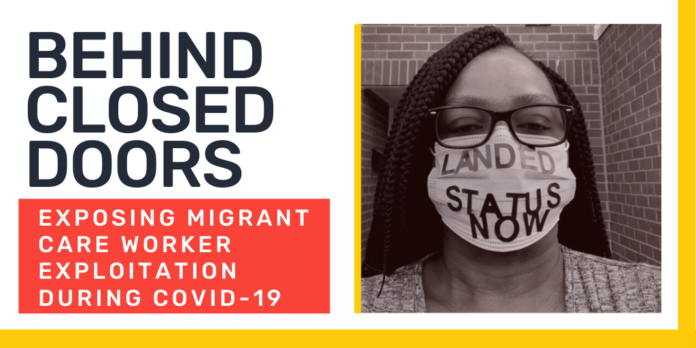MIGRANT care worker organizations released a report on Wednesday documenting the experiences of hundreds of racialized migrant domestic workers during COVID-19. The report, “Behind Closed Doors: Exposing Migrant Care Worker Exploitation During COVID-19”, features shocking stories of abuse including working every day without a break, thousands of dollars in stolen wages, workers being trapped in employers’ homes for months, and being laid off and evicted. The report documents how these crises threaten workers’ ability to unite with their families and access permanent residency, and calls for full and permanent immigration status for all migrants as the only solution.
Report: www.MigrantRights.ca/BehindClosedDoors
“I came to Canada for my future and my family’s future, but my employer took advantage of me and underpaid me because of my tied work permit” said Karen Savitra, a migrant care worker from the Philippines who has been in Canada since 2016 and is a member of the Caregivers’ Action Centre. She worked 12 hours a day, five days a week during COVID-19, but was only paid $1,440 per month until she was fired because her employer moved out of town to escape the pandemic. “We should be given permanent residency upon arrival, along with our families, so that there is no complication for anything. They allowed us to come to Canada, we worked here, now we want fairness.”
The report is based on over 200 surveys that were filled out by migrant care workers from across the country. Nearly one in two respondents that kept working during COVID-19 reported longer hours of work. Over 40% of respondents also reported not being paid for any extra hours of work, averaging approximately $226 in unpaid wages per week, or $6,552 in unpaid wages per worker over the last six months.
“I am worried about being without status. It’s very hard. It’s very scary,” said Harpeet Kaur, a migrant care worker from India and member of the Caregivers’ Action Centre, speaking at the report’s launch. Her work permit is expiring in November, and according to the terms of her work permit, she is not allowed to work for any other employer. “Without full immigration status, migrants like me don’t have the power to protect ourselves even in COVID-19. It’s not fair.”
One in three survey respondents reported not being allowed by their employers to leave the house, take public transit, buy groceries, send remittances to families abroad or visit doctors during COVID-19. Workers were barred from meeting with friends or partners.
In one case, a worker reported her bank account being frozen but not being able to visit the bank to resolve the issue because her employer would not let her leave the house. As a result, the worker was unable to send remittances to her family for three months.
More than one in three survey respondents lost their jobs during COVID-19, and were forced to move out and try to find new work. One in three respondents that lost work reported ongoing problems in accessing the Canada Emergency Response Benefit (CERB) or Employment Insurance (EI). Nearly half of all respondents reported concerns about employers processing their Labour Market Impact Assessments (LMIAs). Without an LMIA, there is no work permit and workers cannot complete the 24 months of work necessary to apply for permanent residency.
“I’m so worried because I need a job to support my family,” said Vancouver-based Judy Cabato, a migrant care worker from the Philippines. Judy, a member of the Vancouver Committee for Domestic Worker and Caregiver Rights, was laid off in April. She has completed the requirements to apply for permanent residency but application processing is delayed due to COVID-19. Her work permit, and therefore her health card and Social Insurance Number, also expired. As a result, she cannot access emergency income support or healthcare. “I’m here in Canada to work. I want to work. My family needs me to work. I am appealing to the government – grant us, all migrants, without exception, full and permanent immigration status for all, and now!”
Over 10,000 people and 350 organizations have joined with the Migrant Rights Network to call for full and permanent immigration status for all. Actions are taking place across Canada on November 1 and 2, including in Montreal, Toronto, Vancouver, Halifax, Sudbury, Niagara and Sherbrooke: www.MigrantRights.ca/Nov1.










